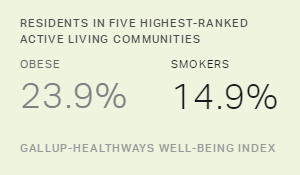WASHINGTON, D.C. -- More Americans than ever want to ban smoking outright: 22% say so today, up from 12% in 2007. Separately, 55% would make smoking in all public places totally illegal, also a proposal that has gained considerable support since 2007.
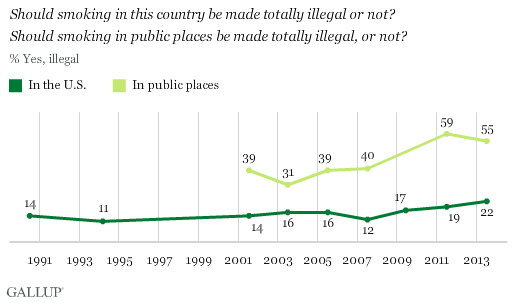
These data are from Gallup's annual Consumption Habits poll, conducted July 10-14.
Nonwhites, Less Educated More Likely to Want to Ban Smoking
Though support is growing, the percentage of Americans wanting to ban smoking entirely remains relatively low. However, 39% of nonwhites back a universal smoking prohibition. Also, those with no more than a high school diploma, at 29%, are more likely than those with more education to say they want to make smoking illegal, even though Gallup has found that Americans with no college education are generally the most likely to smoke.
Fewer than one in 10 smokers support outlawing smoking. Also, individuals living in the Midwest are comparatively less supportive of a complete ban -- 12% say smoking should be illegal, compared with roughly a quarter in other regions. Democrats are more likely than Republicans to support a smoking ban, with Republican support roughly in line with that of the overall adult population.
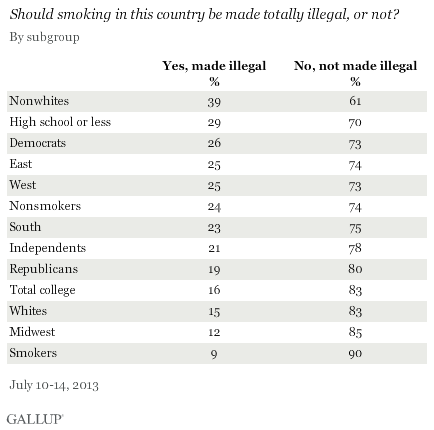
More See Secondhand Smoke as Harmful
The same survey finds that Americans' attitudes toward the harmfulness of smoking and secondhand smoke have remained relatively stable over the past decade, with 82% now saying smoking is "very harmful" to adults. Another 13% deem it somewhat harmful, while 4% see it as not too or not at all harmful.
A new high of 59% now believe secondhand smoke is very harmful, and another 29% believe it is somewhat harmful.
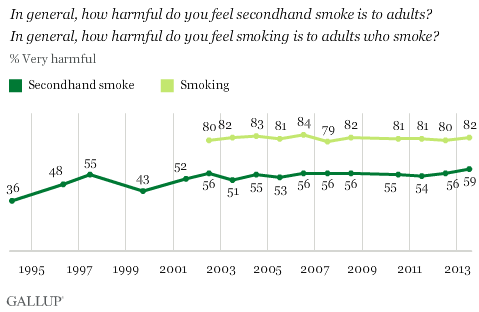
Though fewer adults say secondhand smoke is as harmful as smoking itself, there has been a dramatic change in attitudes on this question since 1994, when 36% said exposure to smoke was very harmful to adults.
Smokers Less Likely to See Smoking or Secondhand Smoke as Harmful
The percentage of Americans saying smoking is harmful shows remarkably little variation by age, education, race, and political and ideological group. One segment that -- not surprisingly -- stands out from this broad consensus is smokers themselves, who are significantly less likely to see smoking as very harmful: 63% of smokers say so, versus 82% of all adults. Smokers also see secondhand smoke in a slightly more benign way -- 18% say it is not too or not at all harmful, compared with 10% of all adults. The degree to which secondhand smoke is harmful is viewed differently by racial and ethnic status. Fifty-two percent of non-Hispanic whites believe secondhand smoke is very harmful, while almost three-quarters (73%) of nonwhite adults do.
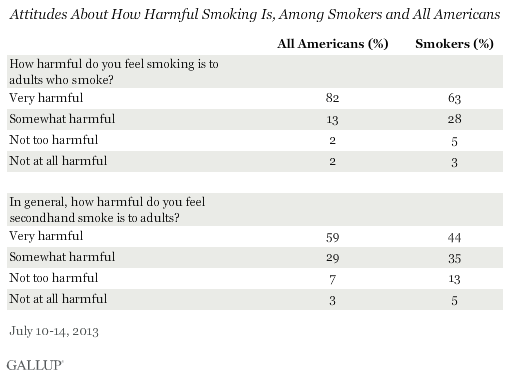
Still, most Americans, regardless of background, see smoking as a harmful activity. One key reason for this is almost all Americans believe cigarette smoking is one of the causes of lung cancer (91%) and heart disease (81%). While this is not a recent development, it is a large shift from the 1950s, when about four in 10 Americans believed smoking could cause either of these serious diseases.
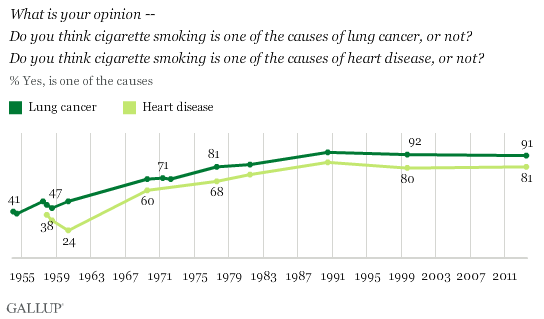
Bottom Line
Forty-nine years after the U.S. Surgeon General issued a historic report advising the public on the risks of smoking, most Americans are convinced that it is dangerous. The large majority also now see secondhand smoke as harmful.
No doubt related to these views, an increasing percentage of adults would like to see smoking in public places banned or even smoking itself prohibited entirely. As attitudes have changed, policymakers have responded in kind -- 28 states and the District of Colombia now have laws that prohibit smoking in most public places and workplaces, including restaurants and bars.
No state has made smoking completely illegal, but this could be the next frontier. A bill introduced in the Oregon state legislature this year would make cigarettes illegal to purchase without a doctor's prescription (something a doctor is very unlikely to do), effectively banning them. While the bill never received a vote during the 2013 legislative session, such efforts may be more common in the future.
Survey Methods
Results for this Gallup poll are based on telephone interviews conducted July 10-14, 2013, on the Gallup Daily tracking survey, with a random sample of 2,027 adults, aged 18 and older, living in all 50 U.S. states and the District of Columbia.
For results based on the samples of 972 national adults in Form A and 1,055 national adults in Form B, the margin of sampling error is ±4 percentage points.
For results based on the sample of 338 smokers, the maximum margin of sampling error is ±6 percentage points.
Interviews are conducted with respondents on landline telephones and cellular phones, with interviews conducted in Spanish for respondents who are primarily Spanish-speaking. Each sample of national adults includes a minimum quota of 50% cellphone respondents and 50% landline respondents, with additional minimum quotas by region. Landline and cell telephone numbers are selected using random-digit-dial methods. Landline respondents are chosen at random within each household on the basis of which member had the most recent birthday.
Samples are weighted to correct for unequal selection probability, nonresponse, and double coverage of landline and cell users in the two sampling frames. They are also weighted to match the national demographics of gender, age, race, Hispanic ethnicity, education, region, population density, and phone status (cellphone only/landline only/both, and cellphone mostly). Demographic weighting targets are based on the March 2012 Current Population Survey figures for the aged 18 and older U.S. population. Phone status targets are based on the July-December 2011 National Health Interview Survey. Population density targets are based on the 2010 census. All reported margins of sampling error include the computed design effects for weighting.
In addition to sampling error, question wording and practical difficulties in conducting surveys can introduce error or bias into the findings of public opinion polls.
View methodology, full question results, and trend data.
For more details on Gallup's polling methodology, visit www.gallup.com.
